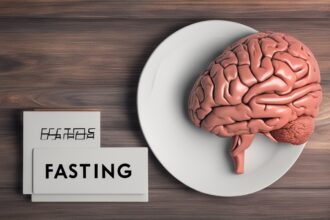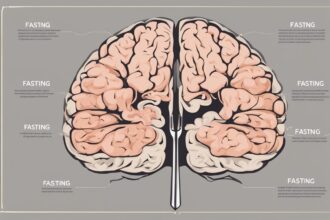Intermittent fasting (IF) has gained immense popularity in recent years, not only for its potential to aid in weight loss but also for its profound effects on overall health. Among the many benefits, intermittent fasting cognitive benefits have emerged as a compelling area of research. Scientists and health enthusiasts alike are intrigued by how this dietary practice, which involves alternating periods of eating and fasting, can enhance brain function, improve mental clarity, and even protect against age-related cognitive decline. In this post, we’ll explore the science behind these benefits and how IF might be a game-changer for brain health.
What Is Intermittent Fasting?
Intermittent fasting is not a diet in the traditional sense but rather an eating pattern. It focuses on when you eat rather than what you eat. Common IF protocols include the 16/8 method (fasting for 16 hours and eating during an 8-hour window), the 5:2 diet (eating normally for five days and restricting calories on two non-consecutive days), and alternate-day fasting. While IF is often associated with weight management, its impact extends far beyond the waistline. Research suggests that intermittent fasting cognitive benefits may include improved memory, focus, and even a reduced risk of neurodegenerative diseases.
How Intermittent Fasting Impacts Brain Health
The brain is a highly energy-dependent organ, and fasting appears to trigger adaptive responses that enhance its resilience. During fasting periods, the body shifts from using glucose as its primary fuel to producing ketones, which are derived from fat stores. Ketones are a more efficient energy source for the brain and may protect neurons from damage. Studies indicate that intermittent fasting cognitive benefits stem from this metabolic switch, which can reduce oxidative stress and inflammation—two key factors in cognitive decline. Additionally, fasting promotes autophagy, a cellular “clean-up” process that removes damaged components and supports brain cell health.
For more on how dietary patterns influence brain function, check out our related post on Nutrition and Brain Health.
Intermittent Fasting and Cognitive Performance
One of the most exciting intermittent fasting cognitive benefits is its potential to boost cognitive performance. Fasting has been shown to enhance focus and mental clarity, likely due to increased levels of brain-derived neurotrophic factor (BDNF), a protein that supports neuron growth and synaptic plasticity. Higher BDNF levels are associated with improved learning and memory. In animal studies, IF has been linked to better performance in memory tests, and early human studies suggest similar outcomes. For individuals seeking to optimize productivity, IF might offer a natural way to sharpen the mind.
If you’re curious about other ways to enhance focus, read our article on Mindfulness for Mental Clarity.
Neuroprotection and Long-Term Brain Health
Intermittent fasting may also play a protective role against neurodegenerative conditions such as Alzheimer’s and Parkinson’s diseases. Research indicates that IF can reduce the accumulation of toxic proteins in the brain, a hallmark of these disorders. By lowering inflammation and improving insulin sensitivity, fasting creates a brain environment less conducive to degeneration. This protective effect is one of the most promising aspects of intermittent fasting cognitive benefits, especially as the global population ages and the prevalence of cognitive disorders rises.
Learn more about protecting your brain as you age in our post on Brain Health and Aging.
Practical Tips for Starting Intermittent Fasting
If you’re intrigued by the potential cognitive benefits of intermittent fasting, starting is simpler than you might think. Begin with a beginner-friendly protocol like the 16/8 method, which allows for a daily eating window that fits most schedules. Stay hydrated during fasting periods, as dehydration can negatively impact brain function. It’s also important to maintain a balanced diet during eating windows to ensure your brain receives essential nutrients. As with any lifestyle change, listen to your body and adjust as needed. Consulting a healthcare provider before starting IF is recommended, especially if you have pre-existing conditions.
Potential Risks and Considerations
While the benefits of IF are promising, it’s not suitable for everyone. Fasting can cause irritability, fatigue, or difficulty concentrating in some individuals, especially during the initial adjustment period. People with certain medical conditions, such as diabetes or eating disorders, should avoid IF or proceed under medical supervision. Additionally, over-fasting or inadequate nutrition during eating periods can counteract the positive effects on brain health. Always prioritize a sustainable approach to ensure long-term success and safety.
Disclaimer: This content is for informational purposes only and not a substitute for professional medical advice.
References
- Mattson, M. P., Moehl, K., Ghena, N., Schmaedick, M., & Cheng, A. (2018). Intermittent metabolic switching, neuroplasticity and brain health. Nature Reviews Neuroscience.
- Harvard Health Publishing. (2018). Intermittent fasting: Surprising update.
- de Cabo, R., & Mattson, M. P. (2019). Effects of Intermittent Fasting on Health, Aging, and Disease. New England Journal of Medicine.
- Mayo Clinic. (2020). Intermittent fasting: Does it have health benefits?
- Gudden, J., Arias-Vasquez, A., & Bloemendaal, M. (2021). The Effects of Intermittent Fasting on Brain and Cognitive Function. Frontiers in Aging Neuroscience.






